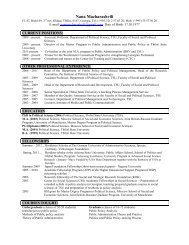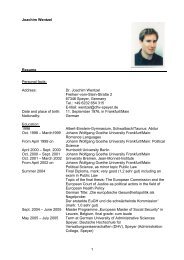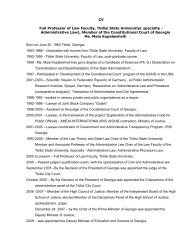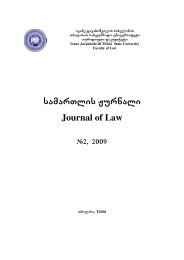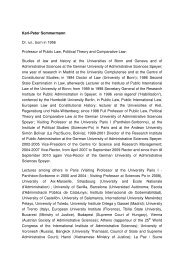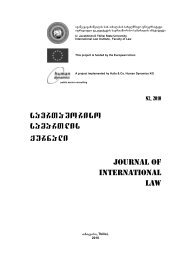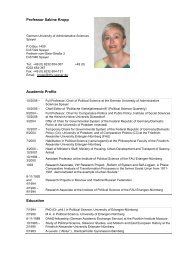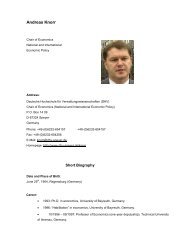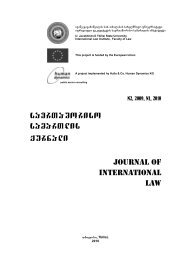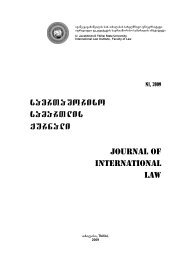Untitled
Untitled
Untitled
You also want an ePaper? Increase the reach of your titles
YUMPU automatically turns print PDFs into web optimized ePapers that Google loves.
saerTaSoriso samarTlis Jurnali, #1, 2008 JOURNAL OF INTERNATIONAL LAW, N1, 2008<br />
cleansing” resulting in mass destruction and<br />
forcible expulsion of predominantly Georgian<br />
population in Abkhazia, Georgia, and of the<br />
violent acts in May 1998 in the Gali region exercised<br />
against the returnees, the goal of which<br />
was provoking fear within those willing to return …<br />
we recommend that a fact-finding mission with<br />
the participation of the OSCE and the United<br />
Nations be dispatched early next year to the<br />
Gali region to assess, inter alia, reported cases<br />
of continued “ethnic cleansing” . 13<br />
Unfortunately, the above-mentioned Commission<br />
has not been created however attributing<br />
such an importance in the OSCE declaration<br />
to the conflict in Abkhazia and once<br />
again condemning egregious crime of “ethnic<br />
cleansing” perpetrated by separatists had immense<br />
importance for mobilizing attention of<br />
the international community.<br />
It is worth mentioning that when discussing<br />
a diaft formulation of the Declaration in<br />
Lisbon, the Russian Delegation was categorically<br />
against its adoption, as we had used the<br />
term “resulting” in the present continious<br />
tense. According to the statements of Russia,<br />
starting from 1994 the Russian peacekeepers<br />
were stationed at Enguri and no ethnic<br />
cleansing had happened there since. Therefore,<br />
according to the position of the Russian<br />
delegation, the term “resulting” should have<br />
been changed with the term “resulted”.<br />
Their position was altered as I submitted<br />
to them the afore-mentioned Report of the<br />
OSCE mission and the list of names of over<br />
1,000 persons killed during the peacekeepers’<br />
presence in Gali region.<br />
I also submitted to them the EU Parliamentary<br />
Resolution of November 14, 1996, which<br />
stated that “Parliament is concerned… due to<br />
continuing process of ethnic cleansing in Abkhazia<br />
region.”<br />
One more note shall be made here, as<br />
the term “mass destruction” was changed in<br />
the Russian translation in a manner that the<br />
word stood not for physical extermination of<br />
population, but more for demolition or ruining<br />
buildings, deriving from the position that “destruction”<br />
also means demolition. I had to deal<br />
with reinstating justice in this case as well and<br />
ultimately the final version of the translation<br />
in Russian was formulated in the following<br />
manner: “îñóøåñòâëÿþò “ýòíè÷åñêóþ ÷èñòêó”,<br />
êîòîðàÿ âûðàæàåòñÿ â ìàññîâîì óíè÷òîæåíèè<br />
è íàñèëüñòâåííîì èçãíàíèè â<br />
îñíîâíîì ãðóçèíñêîãî íàñåëåíèÿ Àáõàçèè”.<br />
(Emphasis made by me – L.A.).<br />
It is to be mentioned that even at the CIS<br />
earlier summits Russia was made to follow the<br />
general position of the participating states and<br />
agree to condemn “ethnic cleansing” in Abkhazia.<br />
For example, the fact of ethnic cleansing<br />
in Abkhazia was directly recognized at the<br />
Summit held in Minsk on 26 May, 1995: the<br />
OSCE Budapest highest level meeting expressed<br />
concern over “ethnic cleansing”, mass<br />
expulsion of predominantly Georgian population<br />
and death of a big number of innocent<br />
civilians. 14<br />
The position of the United Nations Security<br />
Council is notable. If we take into account<br />
the fact that decisions in this body are made<br />
with the majority vote (9 affirmative votes out<br />
of 15 are required), including positive votes<br />
of all the permanent members of the Security<br />
Council, as well as the fact that there always<br />
was and still persists a threat from Russia to<br />
exercise a right to veto with regard to any action<br />
and decision relating to peaceful settlement<br />
of conflicts (Chapter VI of the United<br />
Nations Charter), not to say anything about<br />
possibility of undertaking action in case of a<br />
need of coercive measures for the purpose of<br />
stopping acts of aggression and maintaining<br />
peace (Chapter VII of the United Nations Charter),<br />
there is no possibility over and over again<br />
to declare directly occurrence of “ethnic cleansing”<br />
in Abkhazia. However, OSCE assessments<br />
were and continue to be so strong that Security<br />
Council “recalls” in all of its resolutions adopted<br />
during 1995-2006 the OSCE Budapest<br />
decisions and following that the conclusions<br />
of the Lisbon and Istanbul Summits and considers<br />
the demographic changes as a result<br />
of the conflict in Abkhazia unacceptable. 15<br />
It s to be mentioned here that until 2006<br />
all the resolutions included a reference to the<br />
Lisbon and Istanbul decisions, such as for example<br />
in the resolution adopted in 2002, the<br />
Security Council “recalls” the Lisbon (S/1997/<br />
57, Annex) and the Istanbul Summit conclusions<br />
concerning the situation in Abkhazia,<br />
Georgia. 16<br />
Notwithstanding the fact that since 2006<br />
the Council does not use this formula it systematically<br />
reaffirms the Resolutions containing<br />
the above-mentioned formula. 17<br />
The United Nations Security Council has<br />
taken very inactive role in resolving the con-<br />
42



